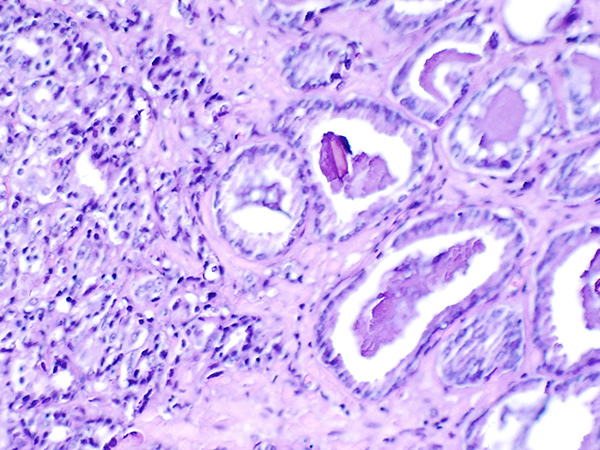Expanded Use for Targeted Prostate Cancer Therapy
The FDA approved darolutamide for the treatment of metastatic prostate cancer that is sensitive to hormone-blocking treatment.
The U.S. Food and Drug Administration (FDA) has approved darolutamide (Nubeqa), in combination with the chemotherapy docetaxel, for the treatment of adult patients with metastatic prostate cancer that responds to testosterone-blocking treatments.
Darolutamide is an inhibitor of the androgen receptor which, when activated by the hormone testosterone, supports the normal functions of male reproductive organs. In prostate cancer, testosterone signaling can drive tumor growth, and tumors are often sensitive to blockade of the androgen receptor pathway via drugs that block the androgen receptor; drugs that stop the body’s production of testosterone; and/or castration (removal of the testes).

The FDA previously approved darolutamide for the treatment of localized tumors—those that have not metastasized—that developed resistance to other hormone-blocking therapies. This approval makes darolutamide available to certain patients with metastatic disease.
The approval was based on the ARASENS clinical trial, a randomized, multicenter, double-blind, placebo-controlled trial that randomly assigned 1,306 patients to receive the chemotherapeutic docetaxel with darolutamide or with a placebo. All patients had either undergone surgical castration or had been given a drug to prevent testosterone production. The median overall survival was not reached among patients treated with darolutamide, compared with 48.9 months among patients treated with placebo. Similarly, patients treated with darolutamide experienced a significantly longer time to pain progression than patients treated with placebo.
Prostate cancer is the most common non-skin cancer diagnosed in men. Federal statistics estimate that over 268,000 men in the U.S. will be diagnosed and over 34,000 men will die from the disease in 2022. Hormone-targeting therapy remains the most common treatment for prostate cancer, and the availability of new androgen receptor inhibitors may help prevent, delay, or overcome resistance to these therapies in some patients.
The FDA rendered its decision on August 5, 2022.
